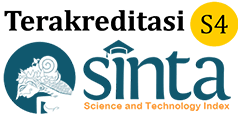Pemahaman Korupsi Dalam Teori Pilihan Rasional dan Hubungan Prinsipal-Agen
DOI:
https://doi.org/10.30742/juispol.v2i2.2592Abstract
Korupsi merupakan salah satu masalah serius yang dihadapi oleh negara-negara berkembang, termasuk Indonesia. Sudah banyak perangkat hukum formal dan kelembagaan yang dibentuk untuk mencegah tindak pidana korupsi, tetapi korupsi masih tinggi. Tujuan kajian ini adalah untuk memahami tindakan korupsi dari dua perpspektif teori yang berbeda, yaitu teori pilihan rasional dan teori prinsipal-agen. Metode penelitian ini adalah deskriptif dengan jenis kajian pustaka. Sifat data adalah primer berdasarkan sumber literatur yang relevan dalam bentuk buku dan jurnal ilmiah. Hasil kajian ini menunjukkan bahwa korupsi sulit diberantas karena ada rasionalitas dari para pelakunya. Tindakan pelaku korupsi dipengaruhi oleh pertimbangan-pertimbangan tertentu dengan suatu tujuan sehingga dengan adanya tujuan tersebut terbentuklah pilihan-pilihan rasional dalam bertindak. Teori pilihan rasional menyatakan bahwa semua individu adalah agen rasional yang terlibat dalam aktivitas yang dimotivasi semata-mata oleh kepentingan pribadi. Sementara itu, teori prinsipal-agen mendalilkan bahwa setiap individu bertindak untuk kepentingannya sendiri, memaksimalkan keuntungan pribadi. Dalam hubungan prinsipal-agen, pihak-pihak yang terlibat dalam korupsi mencari keseimbangan untuk mencapai solusi menang-menang di mana masing-masing pihak merasa puas dengan transaksi yang dilakukan. Kedua perspektif ini, dapat saling melengkapi untuk menjelaskan realitas korupsi sebagai sebuah tindakan rasional diantara para pelakunya. Perlu upaya lanjutan untuk mengintegrasikan kedua teori ini dalam menjelaskan korupsi pada level mikro-meso.
Kata kunci: korupsi, pilihan rasional, prinsipal-agenReferences
Aksel, S. (2016). “Violence and the costs of honesty: Rethinking bureaucrats' choice to take bribes†, 94 (3): 593–608. Public Administration, 94(3), 593 - 608.
Anderson, C. J. (2003). Corruption, Political Allegiances, and Attitudes Toward Government in Contemporary Democracies. American Journal of Political Science , 91-109.
Begovic, B. (2005). Corruption: Concepts, Types, Causes and Consequences. . Washington DC.: Centre for International Private Enterprises.
Coleman, J. S. (1990). Foundation of social theory. Cambridge, MA: Belknap.
Dixit, A. (2004). Games of strategy. New York: W.W Norton.
Graeff, G. M. (2010). Modelling a rational choice theory of criminal action: Subjective expected utilities, norms, and interactions. Rationality and Society, 189-222.
Johnston, M. (1994). Comparing Corruption Conflicts, Standards and Development . the XVI World Conference of the International Political Science Association. Berlin: International Political Science Association.
Juraev, J. (2018). Rational choice theory and demand for petty corruption. Journal of Eastern European and Central Asian Research (JEECAR), 1-10.
K. Basu, S. B. (1992). “Notes on bribery and the control of corruption,â€. Journal of Public Economics, 349–359.
Karlström, B. (2003). “Korruptionens anatomi- orsaker, konsekvenser och botemedelâ€. Corruption. Working Paper,.
Lawson, T. (2003). Reorienting economics. London & New York: Routledge.
Marquette, H. (2015). Theoretical (Mis)understanding? Applying pricipal-agent and collective action theories to the problem of corruption in systematically corrupt countries. In A. Lawton, Ethics in public policy and management (pp. 150-173). London: Routledge.
McLendon, M. (2003). State governance reform of higher education: Patterns, Trends, and theories of the public policy process. In J. Smart, Higher education: handbook of theory and research (pp. 57-144). London: Kluwer.
Mehlkop, G. (2010). Modelling a rational choice theory of criminal action: Subjective expected utilities, norms, and interactions. Rationality and Society, 189-222.
Mosquera, M. (2013, November 13). Edmond & Lily Safra Center for Ethics. Retrieved from https://ethics.harvard.edu/blog/preferences-types-corruption: https://ethics.harvard.edu/blog/preferences-types-corruption
Nane, G. (2007). Does rational choice explain corruption and its persistence adequately. Annual conference of the Association of Heterodox Economics (pp. 23-46). Bristol England: South bank university.
Otusanya, J. O. (2011). Corruption as an Obstacle to Development in Developing Countries: A Review of Literature. . Journal of Money Laundering Control, 14(1), 387 - 422.
Schofield, N. (1996). Rational Choice and Political Economy†in The Rational Choice Controversy . Yale: Yale University Press.
Simon, H. A. (1979). Rational decesion makin in business organizations. American: Economic Review.
Torsello, D. (2013). The perception of corruption as social and institutional pressure: A comparative analysis of cultural biases. Journal Humaff 23, 160-173.
Tullock, G. (1965). The politics of bureaucracy. Washington: Public Affairs Press.
Warren, M. E. (2004). What Does Corruption Mean in a Democracy? American Journal of Political Science 48(2), 328-343.
Zaleha, O. (2014). Socio economic trend of corruption research. . Procedia - Social and Behavioral Sciences 164, 248-257.





